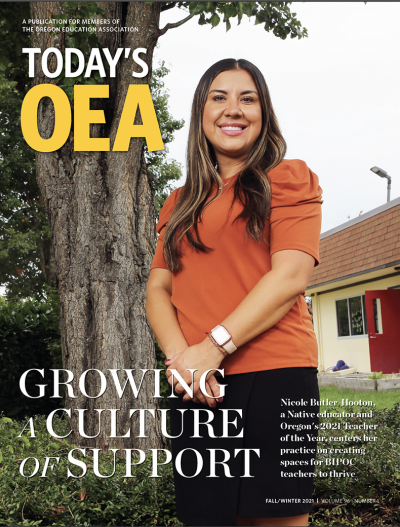“School’s out for summer!” is an oft-heard rallying cry heard as students stream out the doors after the final bell rings each June. They are off to their various endeavors, and after a few final days to button up classrooms, scour cafeterias and file those final attendance slips away, so are educators.
Summer is a time to recharge for educators across the country, but the ways they find to do so run the gamut from more work to lots of play and everything in between. Some teachers lock their classroom doors only to head right back to school themselves, like Erin Beard, who is pursuing her doctorate degree through the University of Oregon. Others, like Matt Bell, seek out mountains to climb for adrenaline-fueled adventures. Still others take on a second job, either to make ends meet or to save some extra money for goals like traveling and retirement.
Some take students on trips or travel internationally with family and friends. Some, like Megan Fitzgerald, travel south to the Mexican border to volunteer for a cause they believe in. All squeeze every last drop out of summer, knowing as all educators do that very soon, the back-to-school bell will sound again, and long, lazy summer days turn back into full-time work weeks filled with the labor and love that is the education profession.
“I think our nine months of the year is pretty compressed,” says Beard, who teaches social studies at Hedrick Middle School in Medford. “We’re doing twelve months of work in nine. There’s no way anyone can get truly prepped in the hours we are supposed to be in the school building. So it’s a trade-off, but it’s not time off.”
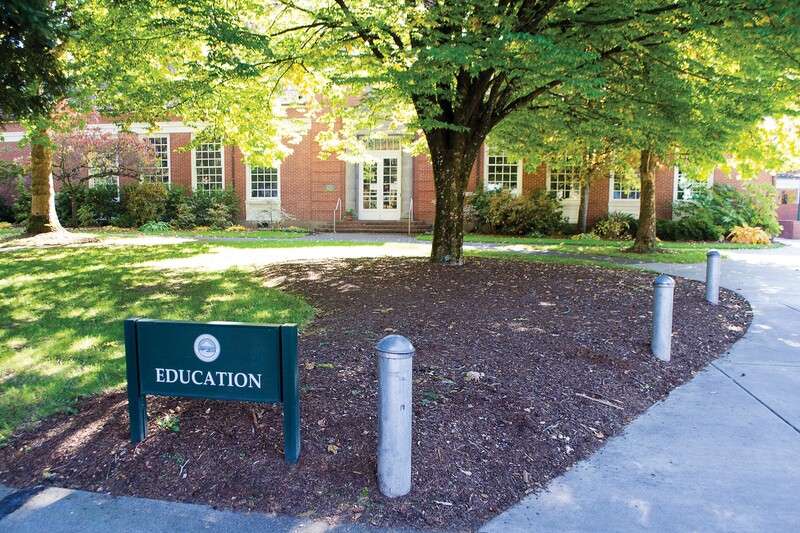
Erin Beard
Beard has been juggling doctorate degree coursework with her teaching career since 2017. She teaches eighth grade social studies at Hedrick Middle School. The coursework is online, which allows her to take classes at the University of Oregon while living in Medford. Specifically, she’s enrolled in the educational methodology, policy, and leadership department. By the end of the 2019-2020 school year, after successful defense of her dissertation, Beard will have earned her doctorate of education (EdD) degree.
“Because of my work with the OEA Center for Great Public Schools, I’m really passionate abut classroom assessment, so my dissertation is about how I could design a professional development experience where classroom assessment and trauma-informed practice and equity are all merged into one professional development experience,” she says.
Balancing full-time classes with a full-time teaching career while raising three kids is no easy feat, though Beard says she’s lucky to have supportive family surrounding her. The grind doesn’t end in the summer, though the load lightens a bit when school vacation gets underway. This has allowed Beard to intensely focus on her studies during the summer months.
And this June, when she’s earned her degree and school is truly out for the summer? Beard has her eyes on her EdD prize, but knows she will enjoy some well-earned time off with her family.
Parker McKinley
McKinley teaches sixth grade and coaches high school baseball in La Grande. In his spare time, he owns and operates We Paint La Grande, a company he started with a family friend about 20 years ago. While McKinley devotes about 10-15 hours a week to the paint business during the school year, the operation really ramps up each summer.
We Paint La Grande has three full-time, year-round employees, but in the summertime, McKinley hires six to eight high school student athletes to work for the company, too.
“We feel like there’s a lot of different ways we can impact kids in a positive way,” McKinley says about why he and his business partner go out of their way to hire and train students. “We’re helping teach them a trade, which we are so in desperate need of in all parts of Oregon and the northwest.”
Sports are a passion for McKinley, who makes sure to build student schedules around athletic schedules for student workers who are interested in continuing to grow as athletes during the summer.
One of the reasons he decided to start a business, in fact, is because it allows his family, which includes his wife and four kids, the freedom to participate in extracurriculars and sports. In fact, he credits his wife with being the main reason he is able to juggle so many responsibilities, calling her his “teammate in every way.”
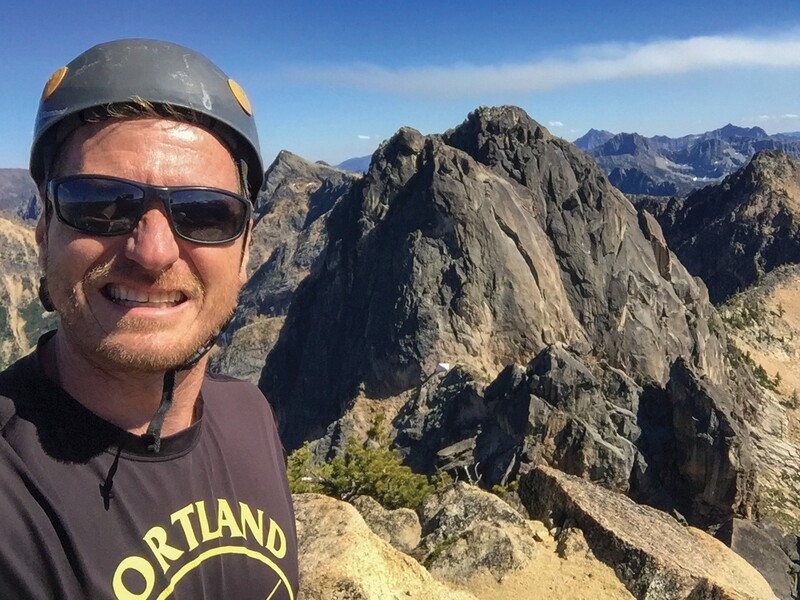
Matt Bell
Bell spends his school year teaching social studies at Wood Middle School in Wilsonville, but as if wrangling young adolescents isn’t enough of an adventure, he spends his summers climbing mountains and traveling, sometimes with students in tow.
This summer, Bell climbed a number of mountains in the Pacific Northwest, including Mt. Olympus, Mt. Washington and Mt. Rainier, as well as Three Fingered Jack, South Early Winter Spire and Liberty Bell Mountain. He also made a trip to Wyoming to climb Grand Teton and Wolf’s Head, which he calls the highlight of his summer.
“I definitely like being out in nature and the views, the camaraderie with people (and sometimes the solitude from people); the physical challenge, the mental challenge and the group aspect as well,” he says.
Bell got involved in mountain climbing in 2001 when he took a beginning mountain climbing course with the Mazamas, a mountaineering organization based in Portland. Since then, he has climbed a number of other mountains including Mt. Hood and has completed both the intermediate and advanced mountain climbing courses with the Mazamas.
Summers off allow Bell the chance to climb and focus on his own interests outside of school.
“I usually do three or four mountains (each summer), but based on taking that [advanced] class, I did a lot more to really dial in those skills,” Bell says about the climbing he did this past summer.
But that’s not all. Bell also took a group of students to Peru through EF Educational Tours. Bell says he started planning this trip nearly two years ago, so families would have a chance to save and plan for international travel. A whirlwind of activities were crammed into nine days, including visiting Lima, Cuzco, Incan ruins, and Machu Picchu.
“I’m definitely a go-go-go person and so I like having a teacher’s schedule from that standpoint. There’s not too much flexibility during the school year, but there’s a lot of flexibility in the summer,” he says.
To top it off, Bell even found some time to squeeze in professional development in the form of a curriculum camp offered by his district.
Janelle Rebick
Rebick, a fourth-generation teacher, has spent 22 years in education. While she currently serves as a full-time release local president of the Bend Education Association, she will return to teaching elementary school next fall.
In spite of her veteran teacher status, Rebick says that her circumstances as a single mom, a homeowner, and someone saving for retirement necessitate her taking a second job during the summer. For two summers running, she has worked as a concierge at Sunriver Resort, crediting her childhood education experience as one of her keys to success in this position.
“It’s really just making people have a great experience, and sharing ideas and telling them what to do and what’s available in the area and talking about the local monuments that are around,” she says, describing her summer work. Rebick says she originally applied for a front desk job, but when the interview panel learned that she was a Bend local, they snapped her up for the concierge position.
While her summer job isn’t as mentally fatiguing as teaching, Rebick says it is frustrating to have to work to make ends meet, especially when she lives a modest lifestyle that doesn’t facilitate extravagance or elaborate vacations.
“There’s still such a sense of, ‘Oh, you guys get summers off and you guys have an easy job and you guys are already paid plenty,’ but when you look at the reality of it and how many hours you put in, no, we’re really not,” she says.
Rebick is hopeful she won’t have to work next summer and can get back to hiking, kayaking and camping in the Bend area, things her summer work has left little time for.
“The summertime is meant to be that recharge piece,” she says.
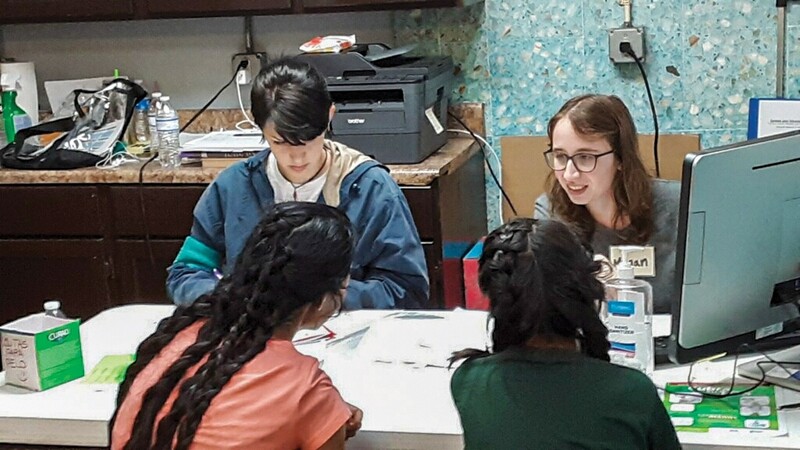
Megan Fitzgerald
Fitzgerald, who teaches second grade at Fern Hill Elementary School in Forest Grove, spent two weeks this summer in Laredo, Texas volunteering at the La Frontera Shelter run by Catholic Charities. Prior to beginning her teaching career in the United States, Fitzgerald received a Fulbright grant that allowed her to teach for a year in Mexico City, an experience she describes as “really beautiful.”
This formative experience has allowed Fitzgerald to connect deeply with her Hispanic students, which ultimately led her to seek an opportunity to help with the border crisis during her summer break.
“With everything in the news lately, I just wanted to do something. I felt helpless about everything I was seeing and my students and their families had been getting more and more nervous and anxious about everything that was going on. So I went and researched different shelters and organizations that were doing direct work on the border, because I had heard all these stories of people coming out of detention centers that were just in really, really bad shape and they needed just about everything,” she says.
Shelter employees said they needed all the help they could get, so Fitzgerald spent two weeks witnessing the harrowing experiences of asylum seekers firsthand. She spent between 10-12 hours a day helping with the 250 people a day who came into the shelter seeking various necessities, everything from food and clothes to access to a phone to help navigating the bus system to get them to waiting family members.
“They were in a really rough state,” she says, describing asylum seekers as they entered the shelter. “They had just been released from detention centers so when they got to the border, they would surrender to border patrol and make their claim for asylum and then they would be processed in the detention centers for who knows how long. They would have come into those places after having been on their journey for months at a time, so a lot of them had nothing except the clothes on their back,” Fitzgerald says.
“They had been walking in the desert, they had faced really traumatic experiences, violence and robbery and every kind of horrible thing you can imagine. So when they’re finally released from the detention centers — and those again were a whole other series of traumatic experiences — they were brought by border patrol to one of the local shelters and just dropped off.”
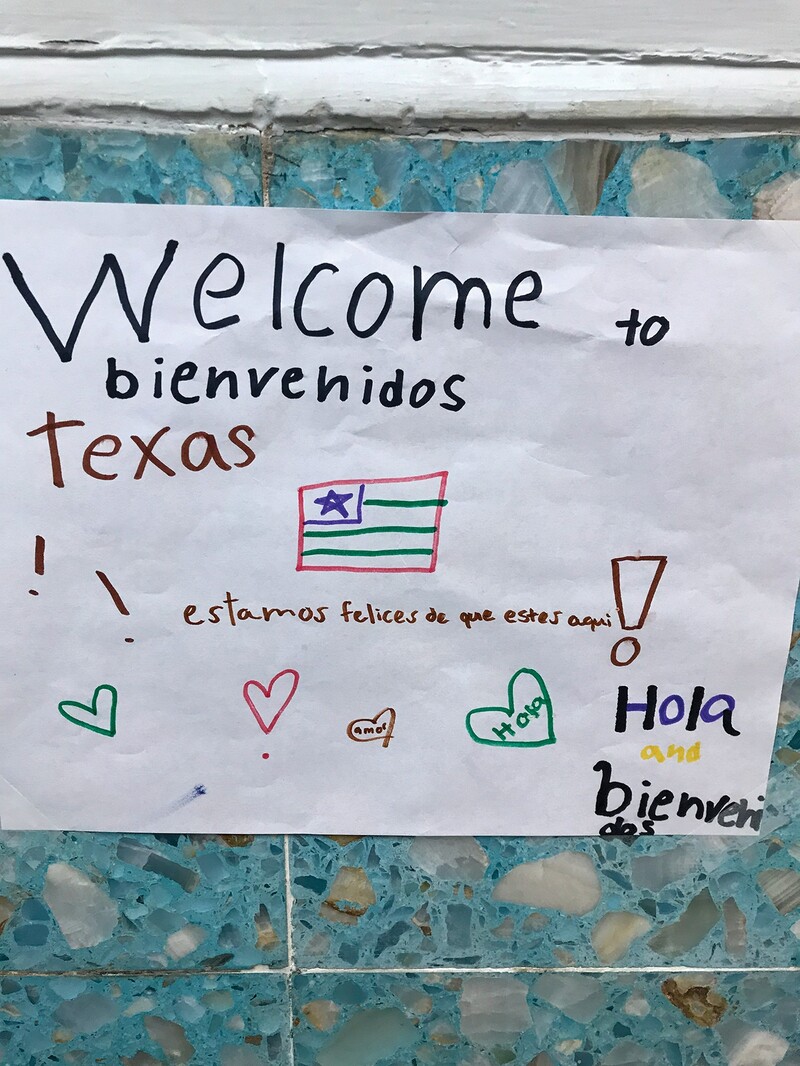
Fitzgerald recounts how the work she did at the border was emotionally draining on account of the conditions faced by refugees in detention centers. Some people came to the shelter in immediate need of hospitalization, and she recalls a baby who had been in the same diaper for a week and a half.
“They’re not being treated like human beings,” she says.
Some counselors came to work with the refugees and Fitzgerald recalls a group session in which refugees were allowed to talk about how they were feeling. “The major emotion they felt was guilt, like they were terrible parents. They felt like, ‘Why would I put my child through this, I didn’t know, I thought I was bringing them someplace good, I thought I was bringing them to a better life.’ ”
Fitzgerald was, at first, tasked with helping sort clothes and donations but soon was placed in an intake position.
“The shelter director explained it to us and said we were the first friendly face they would see, we were the first person to smile and say welcome and treat them like a human being,” she says. “It was very, very emotional.”
In the end, whether educators find themselves at work or at play during the summer months, they all agree that teaching is hard work that comes with a heavy toll. Summer break brings with it a much-needed chance to relax and recharge.
“We don’t teach for the money, we really don’t,” McKinley says. “There’s so much stress in teaching and the stakes are so high and the kids need so much. It’s a difficult time to be a teacher. It’s demanding and it can be really stressful … but on that same note, I don’t know of any more rewarding careers than what we do.”
Beard echoes McKinley’s sentiments, noting that “the reality of the classroom is we’re learning more about the impact of trauma and life on human beings, both kids and adults, and it’s an emotionally hard labor job. We’re not just content specialists - we are making sure our humans are intact, and that’s exhausting work. I think the summer is an important time for teachers to reset and recharge to be able to come back and juggle a more than full-time job taking care of humans — the kids and the adults.”
How did you spend your summer as an educator? We’re always interested in learning our members’ stories! Connect with us on Facebook and tell us about your experiences.

